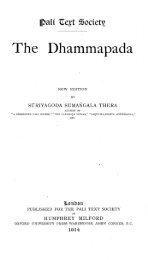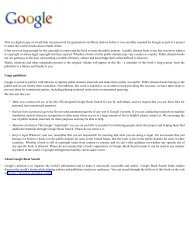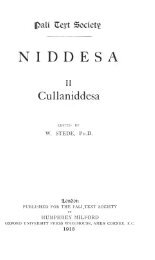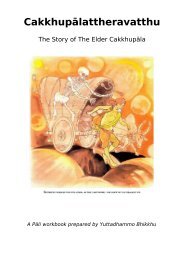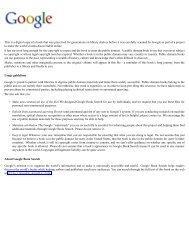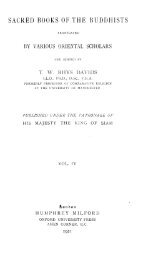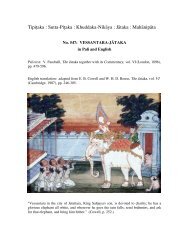Lessons In Practical Buddhism - Sirimangalo.Org
Lessons In Practical Buddhism - Sirimangalo.Org
Lessons In Practical Buddhism - Sirimangalo.Org
You also want an ePaper? Increase the reach of your titles
YUMPU automatically turns print PDFs into web optimized ePapers that Google loves.
something goes contrary to our expectations; to see this bed<br />
that we've made for ourselves; to see this nest, this house<br />
that we've built for ourselves. We build a home for ourselves<br />
in the mind. Whatever seeds you sow, so is the fruit you<br />
reap. This was said by the Buddha, at least five-hundred<br />
years before it was written down in Christian texts - "yādisaṃ<br />
vapate bījaṃ, tādisaṃ harate phalaṃ. (SN 11.10)"<br />
From the meditation practice itself, we see that doing good<br />
deeds leads to good results and doing bad deeds leads to<br />
bad results. It's not an intellectual teaching. You reap what<br />
you sow. We may ask ourselves, "is it really true?" We see<br />
all these rich people who do such horrible things and don't<br />
see them reaping anything, except more good; this makes us<br />
wonder whether cause and effect really works. If you think<br />
intellectually about karma, it can certainly cause a lot of<br />
doubt. When you start to look for complex truths, you find<br />
many problems. But the simple truth is that when you give<br />
rise to a negative mind state, suffering is the only result you<br />
can expect. Ask yourself, when you get angry, when you get<br />
greedy, when you are conceited or arrogant, how do you<br />
feel? Does it form a habit or does it not form a habit?<br />
Suppose you are sitting and you have pain, and you adjust<br />
your position. You think, "oh, that was nice, that worked."<br />
So you think, "wow, this is the truth of suffering, isn't it?"<br />
You get the idea that the truth of suffering is sitting still on a<br />
meditation mat, and so all you have to do to be free from<br />
suffering is not sit on a meditation mat. When the suffering<br />
comes, what's the path that leads to the cessation of<br />
suffering? Moving. Massaging. Stretching. This, you think,<br />
is the path to the cessation of suffering, only the suffering<br />
always comes back again, and when it does do you think you<br />
will be less inclined to move or more inclined to move? Of<br />
course, you will be more inclined. Habits are not static. You<br />
become more averse to the feeling; more set in the view that<br />
you can and should try your best to avoid suffering, that it's<br />
under your control.<br />
We think that all we have to do is find that magic button. It's<br />
the same with mindfulness. We think if we find the magical<br />
button, we'll be mindful all the time. We think we're doing<br />
something wrong when we're not mindful. We beat<br />
141



